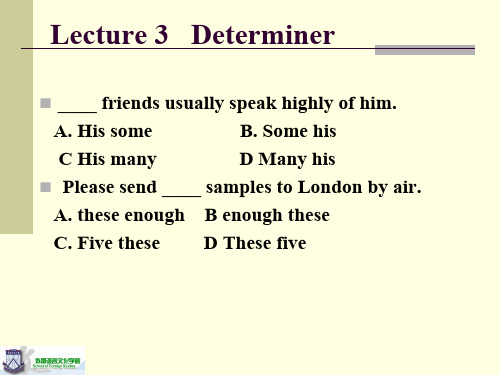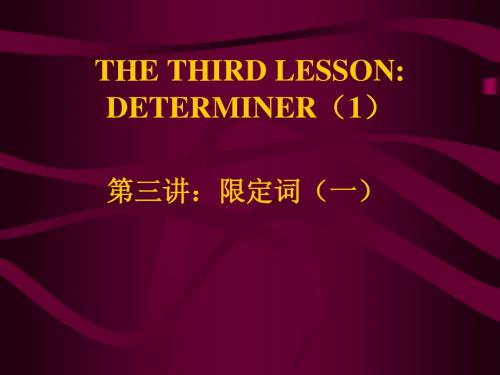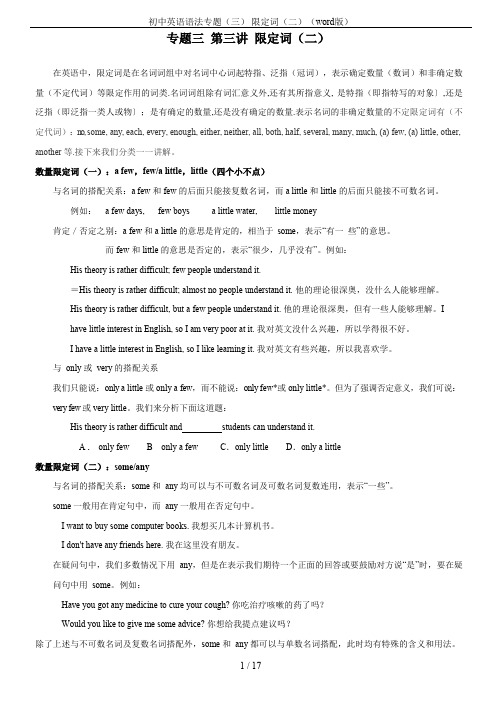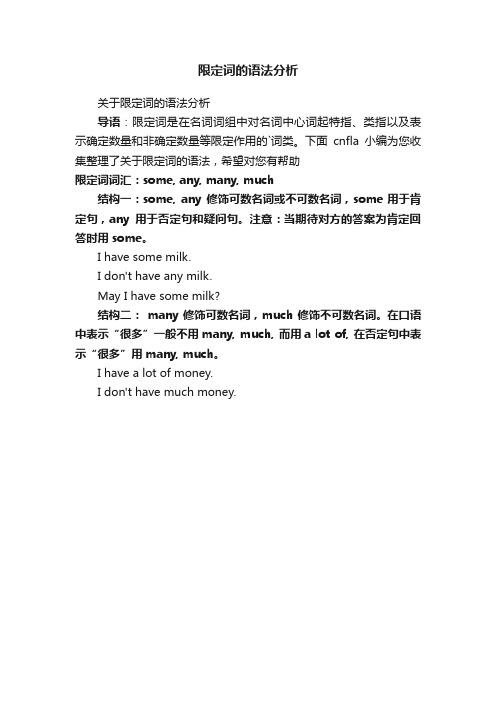第三讲限定词
大学英语语法之限定词ppt课件

2) One day they crossed the ____bridge behind the palace.
表示“形状”的词如:round square等。
“国籍”指一个国家或地区的词。
“材料”的词如:wooden, woolen, stone , silk等。
“作用类别”的词如:medical, college,writing desk,
police car等
9
典型例题: 1) Tony is going camping with ___ boys.
3 .( 2004 年辽宁卷 22 题) John Smith , a successful businessman , has a car .
A . large German white
B . large white German
C . white large German D . German large white
Such a beautiful girl. 2.As the old saying goes, there is no such thing as a
free lunch.
5
2.三类限定词的搭配关系
搭配关系:前位——中位——后位, 只含两类词时也适 用。
All the four teachers , all your three books , all these last few days , half his lecture , those last few months , such a misfortune …… The teacher asked his students to write their answers on every other line. Both my brothers have graduated from universities. The old men had a very good time during all these last few days.
英语语法---限定词

限定词(determiner)限定词的先后顺序: 前位---中位---后位(一个名词中心词之前不可并用两个前位限定词或两个中位限定词)冠词的表意功能(1)The ten of them have passed the final examination.Ten of them have passed the final examination.Ten of the (these/his) students have passed the final examination.(2)They asked to stop counting presidential votes for a second time.(3)Every boy and every girl___(have) his merits.Every young man, young lady,and child ___(be) requested to take part.Many a person___(be) going to the take the test.(4)Other or anotherCalifornia covers a large area than __________state except Alaska and Texas.Out of the three foreign guests, one is from Frankfurt, ______two are from Vienna.. Don'.los.heart.Hav.___try.There's room for _________people in the back of the bus.(5). ing.We'l.hav.____.five-da.holiday.(6)冠词的用法Who is ___captain of your team?. Mr.Reaga.wa.electe.___Presiden.o.th.Unite.State.i.1980.Charles Dickens,__author of David Copperfield, was a distinguished English novelist.As ____physician, he does not deserve much praise.He was covered with snow from ___head to __foot.The relation between ___teacher and ___student is excellent.This room serves the triple purpose of ___study, ___bedroom and ____sitting room. The old man was sitting in a chair, ___pipe in ___hand.He sat at ___ table, ___coat off, ___head down, and __pen in ___hand.What kind of ___man is he?What sort of ___book do you want?The work is ____pleasure to me.She has developed ___love for labour.Physics is ____ science.He spoke with _____ enthusiasm which inspired us all.Do you like ___ music of ___film?Phonetics is ____science of speech sounds。
大学英语专业语法课件3——限定词Determiner

Independent Genitive
C) when the missing noun refers to church, school, or other public buildings, e.g.
Dickens’ / Dickens’s works, Jones’ / Jones’s poems, Marx’s Doctrine, Ross’s dissertation…
The meanings of Genitive Noun
Genissession, and therefore is called possessive case. But genitive meanings are by no means restricted to possession.
Lecture 3 Determiner
____ friends usually speak highly of him.
A. His some
B. Some his
C His many
D Many his
Please send ____ samples to London by air.
A. these enough B enough these
of-phrase, esp. in idiomatic expressions, e.g. children’s pictorial; a doctor’s degree; men’s clothing; at one’s wits’ end; at swords’ points; a hair’s breadth; a wolf in sheep’s clothing…
语法综述

Contents第一讲英语语法概述第二讲名词第三讲限定词第四讲代词第五讲形容词和副词(一)第六讲形容词和副词(二)第七讲动词概述第八讲时态第九讲语态——被动语态第十讲语气——虚拟语气第十一讲助动词和情态动词第十二讲非谓语动词第十三讲介词第十四讲名词从句第十五讲定语从句第十六讲状语从句第十七讲倒装第十八讲一致关系第十九讲替代和省略练习第一讲 General Remarks1.0 Why to Study English Grammar语言由3个部分组成:语音、词汇和语法英语语法分词法和句法1.1 Morphology词法包括词类、词形变化和用法等1 Parts of Speech or Word Class实义词 Notional Words: 开放型 Open System, 这部分词是大量的(1)看含义(2)看词形(3)看句法功能(4)根据读音2词形变化Inflections(1)名词有单复形式(2)代词有主格、宾格和所有格等(3)形容词、副词有原级、比较级和最高级(4)动词有不定式、过去式、过去分词和现在分词(5)数词有基数词和序数词(6)冠词有不定冠词、定冠词和零冠词1.2 Syntax句法式介绍句子种类和句子结构等内容1 Members of Sentence构成句子、在其中起不同语法作用的部分叫句子成分常见七中句子成分(1)Subject表示句子描述的是“谁”或“什么”,是谓语的陈述对象,通常由名词、代词或与之相当的结构充当(2)Predicate说明主语的动作或所处的状态,由动词充当。
由一个部分独立构成的谓语叫简单谓语Simple Predicate;由两个或更多的部分构成的谓语叫复合谓语CompoundPredicate,例如They study hard. (SP)I want a radio. (SP)Tom can swim. (CP)They are engineers. (CP)(3)Predicative说明主语性质、特征、状态、名称或身份等,与连系动词一起用,构成复合谓语,通常由名词、代词和形容词或与之相当的结构或语结充当,例如My uncle is a writer.This picture looks beautiful.(4)Object表示及物动词动作的对象或内容,或用于介词后构成介词短语。
限定词

every student an apple many a book
either book one copy such a book
(3)只能与复数名词搭配的限定词
有些限定词如both,two,three,another two/three,many ,(a) few,several,these,those,a (great) number of等只能与复 数名词搭配。例如: both workers (a) few words several students these/those books a number of essays two/three visitors many students another two students
基数词(Cardinal Numeral)和序数词(Ordinal Number)
倍 数 词 ( Multiplicative Numeral ) 和 分 数 词 ( Fractional Numeral) 量词(Quantifier):a lot of,lots of,plenty of,a great/ good deal of , a large / small amount / quantity of , a great/large/good number of等。
b) 前位限定词包括all,both,half;double,twice,three times 等;one-third,two-fifths等;what,such (a/ an)等。
c)后位限定词包括one,two,three等;first,second,third 等;next,last,other,another等;many,much,(a) few, (a) little,fewer,(the) fewest,less,(the) least,more,most; several,plenty of,a lot of,lots of,a great/large/good number of,a great/ good deal of,a large/ small amount of; such等。
初中英语语法专题(三)限定词(二)()

专题三第三讲限定词(二)在英语中,限定词是在名词词组中对名词中心词起特指、泛指(冠词),表示确定数量(数词)和非确定数量(不定代词)等限定作用的词类.名词词组除有词汇意义外,还有其所指意义, 是特指(即指特写的对象〕,还是泛指(即泛指一类人或物〕;是有确定的数量,还是没有确定的数量.表示名词的非确定数量的不定限定词有(不定代词):n o, some, any, each, every, enough, either, neither, all, both, half, several, many, much, (a) few, (a) little, other, another 等.接下来我们分类一一讲解。
数量限定词(一): a few,few/a little,little(四个小不点)与名词的搭配关系: a few 和few 的后面只能接复数名词,而 a little 和little 的后面只能接不可数名词。
例如: a few days, few boys a little water, little money肯定/否定之别: a few 和a little 的意思是肯定的,相当于some,表示“有一些”的意思。
而few 和little 的意思是否定的,表示“很少,几乎没有”。
例如:His theory is rather difficult; few people understand it.=His theory is rather difficult; almost no people understand it. 他的理论很深奥,没什么人能够理解。
His theory is rather difficult, but a few people understand it. 他的理论很深奥,但有一些人能够理解。
Ihave little interest in English, so I am very poor at it. 我对英文没什么兴趣,所以学得很不好。
初中英语语法专题(三) 限定词(二)(word版)

专题三第三讲限定词(二)在英语中,限定词是在名词词组中对名词中心词起特指、泛指(冠词),表示确定数量(数词)和非确定数量(不定代词)等限定作用的词类.名词词组除有词汇意义外,还有其所指意义, 是特指(即指特写的对象〕,还是泛指(即泛指一类人或物〕;是有确定的数量,还是没有确定的数量.表示名词的非确定数量的不定限定词有(不定代词):n o, some, any, each, every, enough, either, neither, all, both, half, several, many, much, (a) few, (a) little, other, another 等.接下来我们分类一一讲解。
数量限定词(一):a few,few/a little,little(四个小不点)与名词的搭配关系:a few 和few 的后面只能接复数名词,而a little 和little 的后面只能接不可数名词。
例如: a few days, few boys a little water, little money肯定/否定之别:a few 和a little 的意思是肯定的,相当于some,表示“有一些”的意思。
而few 和little 的意思是否定的,表示“很少,几乎没有”。
例如:His theory is rather difficult; few people understand it.=His theory is rather difficult; almost no people understand it. 他的理论很深奥,没什么人能够理解。
His theory is rather difficult, but a few people understand it. 他的理论很深奥,但有一些人能够理解。
Ihave little interest in English, so I am very poor at it. 我对英文没什么兴趣,所以学得很不好。
限定词的语法分析

限定词的语法分析
关于限定词的语法分析
导语:限定词是在名词词组中对名词中心词起特指、类指以及表示确定数量和非确定数量等限定作用的`词类。
下面cnfla小编为您收集整理了关于限定词的语法,希望对您有帮助
限定词词汇:some, any, many, much
结构一:some, any 修饰可数名词或不可数名词,some用于肯定句,any用于否定句和疑问句。
注意:当期待对方的答案为肯定回答时用some。
I have some milk.
I don't have any milk.
May I have some milk?
结构二:many修饰可数名词,much修饰不可数名词。
在口语中表示“很多”一般不用many, much, 而用a lot of, 在否定句中表示“很多”用many, much。
I have a lot of money.
I don't have much money.。
- 1、下载文档前请自行甄别文档内容的完整性,平台不提供额外的编辑、内容补充、找答案等附加服务。
- 2、"仅部分预览"的文档,不可在线预览部分如存在完整性等问题,可反馈申请退款(可完整预览的文档不适用该条件!)。
- 3、如文档侵犯您的权益,请联系客服反馈,我们会尽快为您处理(人工客服工作时间:9:00-18:30)。
限定词限定词的种类1.前位限定词pre-determinersall/both/half; double/twice/three times; one-third/two-fifths2.中位限定词central determiners■中位限定词包括:冠词:a(n), the指示代词:this, that, these, those形容词性物主代词:my, your, his, her, our, etc名词属格:Jim’s, my mother’s不定代词:some, any, no, every, each, either, neither, enough, etc连接代词what(ever), which(ever), whose, etc举例They may also make still and motion pictures of the trench, take water and sedimental temperatures, and perhaps sight no one knows what living creatures in that perpetual night.他们还要对海沟摄像摄影,测量水和沉积物的温度,也许还能观测到那永恒黑夜下中不为人知的生物。
3.后位限定词post-determiners■后位限定词包括:基数词:one, two, three, etc;序数词:first, second, third, etc一般序数词:next, last, other, another, etc.数量词:many, much, (a) few, (a) little, fewer, (the) fewest, less, (the) least, more, most; several, plenty of, a lot of, lots of, a great / large / good number of, a great / good deal of, a large / small amount of; such等。
all my friendshalf the timehis many bookse.g. He’ll stay here all these last days.前中后限定词与限定词的搭配关系一个名词前如果有两个或两个以上的限定词,那么这些限定词的先后顺序也是有讲究的。
All the four teachers后位限定词可以叠用●Both the twin brothers (前位+中位)●All his three daughters (前+中+后)●Those last few months (中+后+后)4.名词短语中如果有: all, both, exactly, just, many, quite, rather, such, what, etc., 这类词放在冠词前all the timeboth (the) brothersexactly the wrong colourjust the right placequite a nice dayrather a messsuch a funny storywhat an important instrument it is!5.as, how, however, so, too 与形容词连用时, 形容词放在冠词之前考试He’s not so big a fool as you think. She’s as clever a girl as you’re ever likely to meet.This is too heavy a bag for me to carry. How large an armchair did he have? However tiring a day she may have, she never losses her good humour.6.all, both, halfall the year; both my books; half that apple7.most; lastMost farmers are still using the old methods.Most meat is expensive. 不能加定冠词, 是“大多数”的意思You’ve got the most money, so you can pay for the rest of us.George eats the most desserts. 是最高级,必须加定冠词Is she often rude and cross (bad-tempered) like she’s been this last month? 近来这个月His last letter came to me two weeks ago. 上一封8.what; whoseI’m interested in all of what plans she has made.He eats twice what you eat.He eats three times what you eat.It costs double what it did.It costs the double of what it did.His weight is four-fifths what he was five years ago.His weight is four-fifths of what he was five years ago.The residents, all of whose homes had been damaged by the floods, were given help by the Red Cross.9.The 的主要用法Who invented the radio? (category) Who had a radio? (one from the same category)Who manufactured radios? (all the ones in this category)Musical instruments: the guitar /the violin / the piano表示一类The poor/ rich/ old/ dead/ deaf/ elderly/ unemployed/ wounded/ disabled/ aged/ dying/ hearing/ seeing / living/ (plural) The young are impatient; they want changes.The true/ false/ unknown/ unexpected/ (singular)The unknown is always something to be feared.10.不定冠词的主要用法A magnet in a magnetic field will be subject to a force.处于磁场中的磁铁会受到一个力的作用A college student should be concerned about the news both at home and abroad. = College students11.Zero articleGrapes are a kind of fruit. 复数可数名词Honesty is the best policy.不可数名词Australia lies southeast of Asia between the Pacific and Indian Oceans. 专有名词Christmas is the time for familyreunions.June is my favorite month. 在星期、月份、节日名称前Buddhism is now chiefly practiced in theFar East.Go to bed = to sleepGo to church = to prayBe taken to hospita l = to be curedHe spent six months in prison. = to be punishedThe seaman spends most of his life at sea.= to sailbreakfast/ lunch/ dinner/ supperthe wedding dinnerspring/summer/autumn/winter rheumatismJim has never really got over the malaria he caught in Africa.He has a cold/fever/headache/an ache in his back.take/have a walk/a swim/a rest12.another; every is connected with pluralsTed wanted another cup of coffee.I need another five dollars.Every student has a dictionary. Change the oil in the car every 5,000 miles.13. 英语限定词的排列顺序名词前有时候会出现很多限定词,怎么排列它们的顺顺序呢?一般按照以下方法:1限:限定词。
the,my,a,this...2描:描绘性形容词。
brave,beautiful,lovely,nice...3大:大小、高低、长短等形容词。
big,large,small...4形:形状。
round,square...5龄:年龄大小、新旧、年代等。
young,old,new...6颜:颜色。
red,blue,green...7籍:国籍、地区、出处。
Chinese,America,Japanese...8物:物质材料的形容词。
golden,wooden...9类:表示类别、用途。
medical,chemical,writing...14.英语限定词的概念及所包含词类定冠词(DEFINTITE ARTICLE):the;不定冠词(INDEFINITE ARTICLE):a, an;零冠词(ZERO ARTICLE)物主限定词(POSSESSIVEDETERMINER):my, your, his, her,our, your, their, one's, its;名词属格(GENITIVE NOUN):Tom’s, my mother’s;指示限定词(DEMONSTRATIVE DETERMINER):this, that, these, those, such;关系限定词(RELATIVE DETERRMINER):whose, which;疑问限定词(INTERROGATIVE DETERMINER):what, which, whose;不定限定词(INDEFINITE DETERMINER):no, some, any, each, every, enough, either, neither, all, both, half, several, many, much, (a) few, (a) little, other, another;基数词(CARDINAL NUMERAL):one, two, three, four, five…;序数词(ORDINAL NUMERAL):first, second, third, fourth, fifth…;倍数词(MULTIPLICATIVENUMERAL):one third, twothirds…;分数词(FRACTIONALNUMERAL):twice, three times…;量词(QUANTIFIER)a lot of, lotsof, plenty of, a great of, a good dealof, a large of, a small amount of, aquantity of, a great of, a goodnumber of…。
